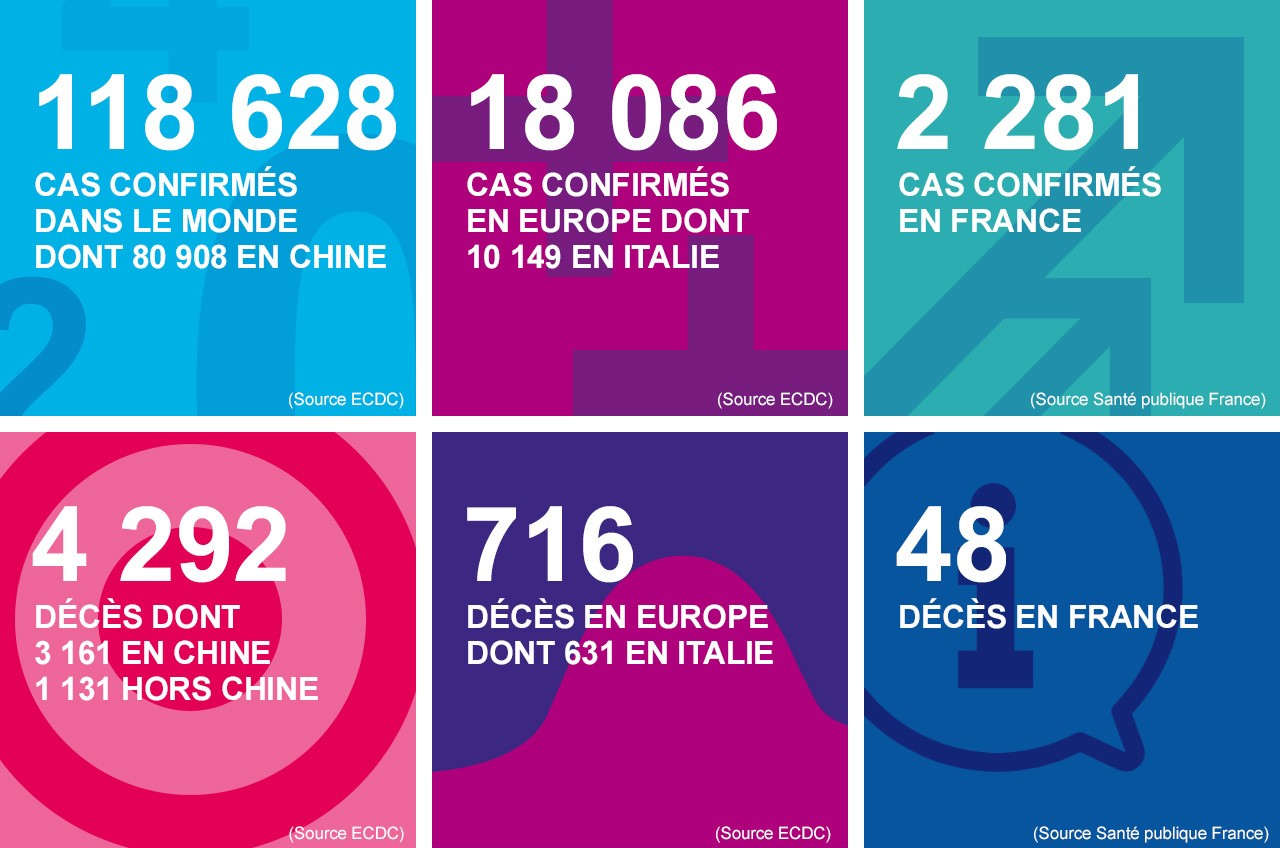Since 24 January 2020, France has had 2,281 confirmed cases of Coronavirus COVID-19 and 48 deaths, including 9 in the Grand Est.
On Wednesday 11 March at 17:00, 587 people were confirmed biologically positive for coronavirus-Covid 19 in the Grand East region. Since yesterday, 123 new cases have been identified in the region. Most of the confirmed cases are linked to the epidemic outbreak in connection with the Lenten Week of the Christian Open Door Church in Bourtzwiller (Upper Rhine).
7 cases in Marne, 1 case in Aube, 1 case in Haute-Marne, 1 case in Ardennes, 3 cases in Meuse, 14 cases in Meurthe-et-Moselle, 59 cases in Moselle, 31 cases in Vosges, 108 cases in Bas-Rhin, 359 in Haut-Rhin and 3 cases originating from Aisne.
Four new deaths have been recorded to date, bringing the total number of deaths for the Grand Est to 9. The three patients who died today, aged 89, 73 and 92 respectively, were from the Bas-Rhin. A 38-year-old patient from the Marne also died.
Epidemiological investigations, in conjunction with Public Health France, are underway in order to identify contact subjects who may present a risk and to take appropriate management measures, in particular to protect vulnerable people and slow the spread of the virus.
Measures for health professionals in the Haut-Rhin region
Pending the replenishment of pharmacies, health establishments (GHRMSA and the Civil Hospitals of Colmar) will be equipped with masks to be distributed to liberal professionals. General practitioners will be supplied as a priority.
– During the week (from 9 to 13/03/20): two other supplies of surgical masks are planned to the reference hospitals, which will enable the supply of other self-employed professionals;
– Hydroalcoholic gel: a decree of 6 March 2020 allows pharmacists to manufacture hydroalcoholic gel and now regulates the selling prices.
Measures concerning outpatient care of patients in the Haut-Rhin region
As the vast majority of forms of this disease are benign (80% of cases), it is possible for people without severe forms and no particular risk factors to be treated and monitored at home, thus avoiding systematic hospitalisation.
Thus, the ARS has developed a protocol for the home care and follow-up of patients, in conjunction with the department’s independent healthcare professionals.
The decision to provide care at home will be taken during a consultation, after obtaining the patient’s consent, by the :
– Referring infectiologist and/or hospital doctor providing care in close collaboration with the attending doctor after the initial care in the health establishment;
– The attending physician after consulting, if necessary, the infectious diseases physician and/or the SAMU-centre 15 for patients treated in a local medical centre;
Reminder of the instructions to be followed
The challenge is to curb the transmission of the virus currently circulating in the territory and to protect areas that are not or only slightly affected. To do this, it is up to each person to put in place the recommended barrier measures:
– Wash your hands with soap very regularly,
– Cough or sneeze into your elbow or into a tissue,
– Use a disposable tissue and discard,
– Salute without shaking hands and avoid hugs.
In case of symptoms (cough, fever) and if you are returning from a risk area or an outbreak of infection, you are asked to stay home and call 15.
In any case, in case of fever or feeling of fever, cough, difficulty breathing, within 14 days of returning from an area where COVID-19 is circulating, people should contact the Samu Centre 15 and avoid contact with their surroundings, and keep a mask on. Individuals are asked not to go to their doctor’s office or to the hospital emergency room.
You will find more information on the Government websites of the Ministry of Solidarity and Health and Public Health France.

